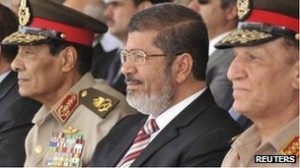 Egypt’s military council has said the decision to dissolve parliament must be upheld, after new President Mohammed Mursi ordered the assembly to reopen.
Egypt’s military council has said the decision to dissolve parliament must be upheld, after new President Mohammed Mursi ordered the assembly to reopen.
The military closed parliament last month after a court ruling.
Its latest intervention is seen by some as a challenge and warning to the president, who was sworn in barely a week ago.
It could be the first confrontation between the military and the president since Mr Mursi’s election.
On President Mursi’s orders, the speaker has convened a meeting of parliament on Tuesday.
Crowds were gathering in Tahrir Square ahead of the meeting called for 10:00 (08:00 GMT) in defiance of the military’s decision.
The Muslim Brotherhood – Mr Mursi’s power base, which has the biggest bloc of seats in parliament – said it would participate on Tuesday “in a million-man march in support of the president’s decision and reinstating parliament”.
The military council said it was confident “all state institutions” would respect the law and constitution.
The BBC’s Jon Leyne, in Cairo, says the political truce in Egypt appears to be over.
It is unclear how events will unfold as the situation – with the new president elected without a new constitution being drafted, and the parliament theoretically dissolved – is unprecedented, analysts say.
‘Binding and final’
The statement from the Supreme Council of the Armed Forces (Scaf) will infuriate the Muslim Brotherhood, our correspondent says.
Members of the Brotherhood believe it was the military that failed to respect the law by giving itself new powers after dissolving parliament last month, he adds.
Earlier on Monday, the Supreme Constitutional Court rejected the decree issued by Mr Mursi the day before to reconvene the Islamist-dominated parliament.
The court said its 14 June ruling – that the law governing Egypt’s first democratic elections in more than six decades was unconstitutional because party members were allowed to contest seats in the lower house reserved for independents – was binding and final.
As the court had not itself ordered the dissolution of parliament, Mr Mursi was not directly challenging a court order, our correspondent says.
No mention was made of the court’s ruling in the decree. And presidential spokesman Yasir Ali argued that Mr Mursi had been quite legitimate in suspending the dissolution until new parliamentary elections took place within 60 days of a new constitution being ratified.
Despite the apparent tensions, the president and Field Marshal Hussein Tantawi, who heads Scaf, appeared together at a military cadet graduation ceremony on Monday.
‘Waste of authority’
The president’s order has not, however, been welcomed by political rivals.
Former presidential candidate Abdul Moneim Aboul Fotouh was said to have denounced his move as unconstitutional while another, Hamdin Sabbahi, was quoted as saying it was a “waste of legal authority”.
Liberal MP Mohammed Abu Hamed urged Scaf to challenge what he called “this constitutional coup”.
The constitutional court is due to hear a number of appeals against the decree on Tuesday, reports say.
Mr Mursi won the country’s first free presidential election last month, and army chiefs formally handed over power on 30 June.
Before Mr Mursi’s inauguration, the military granted itself sweeping powers.
The commanders’ constitutional declaration stripped the president of any authority over the military, gave military chiefs legislative powers, and the power to veto the new constitution, which has yet to be drafted.
BBC
Analysis by: Jon Leyne, BBC News, Cairo
After President Mursi was sworn in just over a week ago, a political truce seemed to come into force. But it seems the quiet days could not last. First, the new president issued an order recalling parliament – putting him directly at odds with the military council, which had dissolved the assembly.
Now the military has responded with what is being seen by some as a warning to the president to obey the law and the constitution. It could be the first big fight between the military and the president since Mohamed Mursi became Egypt’s first civilian president.
MPs are due to gather for a formal session on Tuesday morning. They were allowed back in the building on Monday for the first time since parliament was dissolved and military guards placed outside.
That provided a glimmer of hope that a compromise might be possible. But with a big demonstration planned for Tahrir Square, the political temperature is rising by the hour.
BBC

Leave a Reply
You must be logged in to post a comment.